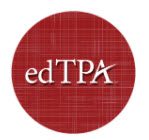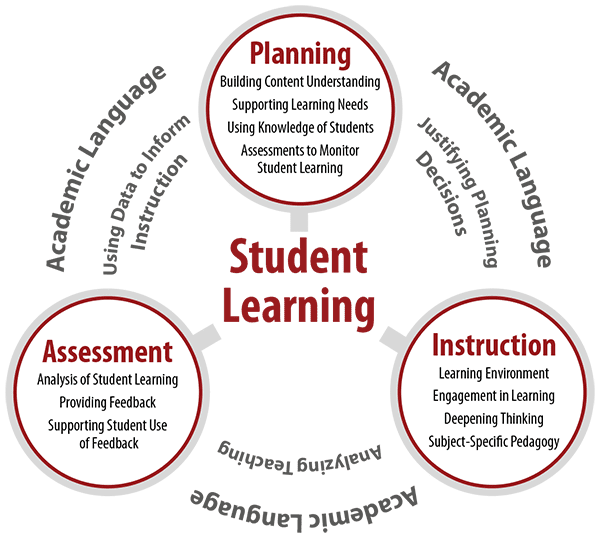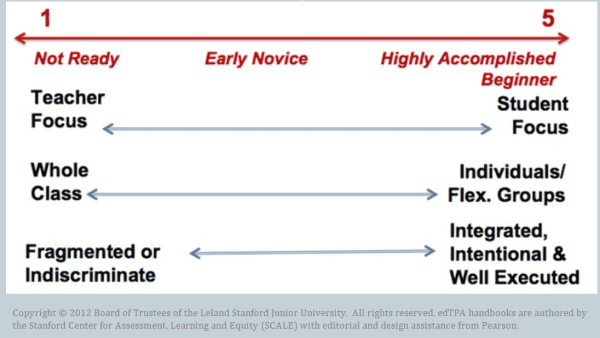Module 2 – edTPA


Module 2 ● edTPA (Plan & Complete Module) (10 mins)
What is it?
The edTPA Teaching Cycle is Focused on Student Learning

edTPA® is intended to be used at the end of an educator preparation program for program completion or teacher licensure and to support state or national program accreditation. Teacher candidates preparing for edTPA® will document their classroom work by submitting a portfolio that includes lesson plans, student assignments, assessments, unedited video clips of the candidate teaching, and commentaries on student learning and how the candidate adjusted instruction to meet student needs.
The teacher candidates are scored on a range from 1 to 5, with 1 being the lowest and 5 being the highest score possible. The rubric progression below shows and gives an overview of how students are scored based on their required submission documents, media, and commentaries.

What is my role in supporting my ST?
edTPA portfolio tasks focus on three main areas of teaching and learning including planning, instruction, and assessment. Your role as a Clinical Educator this semester during the clinical experience portion of YLI is to support teacher candidate understanding of planning, instruction, and assessment. Below are some critical concepts that teacher candidate need to know and understand by the end of this semester in preparation for the full-time teaching experience and edTPA portfolio submission.

Accommodations/Modifications (AIG, IEP, 504)
- How to create an assessment that is directly related to the standard being taught, specifically the function of the standard
(ie., analyze, compare, etc.)
- Differentiation: How and when for all learners (especially through assessment)
- Prior Knowledge and Skills of students
- “Assets” the students bring, cultural, community, personal
- Essential Literacy Skill(s) if applicable
*As you plan to teach, talk your teacher candidate through what you are doing and why you are doing it.*

- How to create and maintain a positive learning environment
- Classroom management strategies and techniques that are effective
- Clear and Precise Directions and Instruction
- Targeted Questioning and Checking for Understanding
- Differentiated and Individualized Support and Feedback
- Modified Instruction: How to modify instruction based on student needs

- Understanding how formative and summative data is used in planning instruction
- How to select Assessments that show knowledge and skills applied (including standards and academic language demands)
- How to give individualized feedback to students with positive language
- Formal and informal assessing (knowing when and how)
- The use of a rubric to assess student learning or mastery
If your teacher candidate is an Elementary Education Student Teacher, he/she may have a Task 4 portfolio to complete during the clinical experience. Below is information regarding the Task 4 requirements and a list of additional supports that may be needed.
NOTE: *For the Fall 2020 and Spring 2021 semesters only, ELED candidates have a 3 task project.
Task 4: Math *ELED only
*Applicable for Elementary Education Majors only
- Second Context for Learning (even if they use the same students from previous group)
- Identify Learning Segment (Learning segment overview)
- Analyze Student Data from a lesson (whole class formative assessment with evaluation criteria)
- Plan and deliver re-engagement lesson
- Re-engage students through a lesson segment (video lesson)
- Re-assess student learning
- Commentary
Task 4
Student Teachers will analyze a formative assessment that students have already taken. They will identify and describe the initial learning segment (doesn’t have to have been taught by them). They will analyze the formative assessment data using evidence criteria (rubric) and then plan and deliver a re-engagement lesson. They will re-assess student learning using the same or a similar assessment and answer the commentary prompts.
Task 4 Supports
- Differentiation for All Learners especially through Assessment (How to read and analyze data and select student group)
- Prior Knowledge and Skills the students have
- Select Assessments that show knowledge and skills applied
- Model and support teacher candidates with the use of formal and informal assessing (knowing when and how)
Final Word on Acceptable edTPA Supports
The Standard Center for Assessment, Learning, and Equity has developed a guide for acceptable forms of support. Please refer to this document for full guidelines on acceptable and unacceptable forms of support to Student Teachers. This guide is in the resources section of this module for your reference.